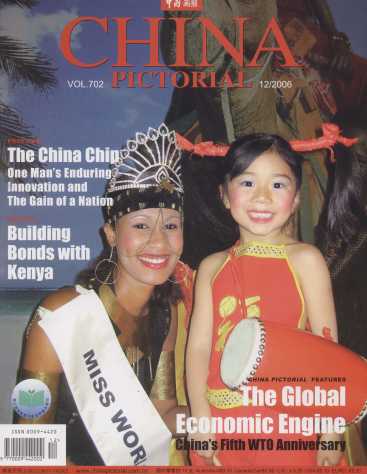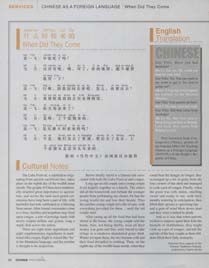Shénme Shíhou Lái De
什么时候来的
When Did They Come
Gāo Yīfēi Zǎofàn chī le ma
高一飞:早饭吃了吗?
Mǎ Lì Hái méi yǒu ne Ò duì le nǐ de dì tú néng bù néng jiè wǒ yòng yī xià
马力:还没有呢。哦,对了,你的地图,能不能借我用一下?
Gāo Yīfēi Xíng a dào wǒ fáng jiān qù ná ba Zěn me nǐ yào chū qù
高一飞:行啊,到我房间去拿吧。怎么,你要出去?
Mǎ Lì Wǒ yào péi wǒ bàmā qù Lì shǐ Bó wù guǎn
马力:我要陪我爸妈去历史博物馆。
Gāo Yīfēi Nǐ fùmǔ qīn lái le
高一飞:你父母亲来了?
Mǎ Lì Shì a Shàng gè xīng qī lái de
马力:是啊。上个星期来的。
Gāo Yīfēi Shì cóng Ào dàlì yà lái de ma
高一飞:是从澳大利亚来的吗?
Mǎ Lì Bù shì Tāmen xiān qù le Xiānggǎng ránhòu qù le Běijīng shàng gè xīng qī cóng Běijīng zuò huǒ chē lái de
教材《当代中文》由国家汉办提供
English Translation
CHINESE
Gao Yifei: Have you had breakfast?
Ma Li: Not yet. Oh, could you lend me your map?
Gao Yifei: Yes. You can come to my room to get it. So, you're going out?
Ma Li: I’m going to accompany my parents to the History Museum.
Gao Yifei: Your parents are here?
Ma Li: Yes, they came last week.
Gao Yifei: Did they come from Australia?
Ma Li: No, they first went to Hong Kong and then to Beijing. Last week they came from Beijing by train.
Text extracted from Contemporary Chinese, project of the National Office for Teaching Chinese as a Foreign Language (NOTCFL) of the People's Republic of China.
Cultural Notes
The Laba Festival, a celebration originating from ancient sacrificial rites, takes place on the eighth day of the twelfth lunar month. The people of China have traditionally attached great importance to agriculture, and across the land such grand ceremonies have long been a part of life, with bountiful harvests celebrated as a blessing from nature. After formal ceremonies come to a close, families and neighbors may feast upon congee, a sort of porridge made with newly reaped millets and grains, long a staple dish across the nation.
There are eight main ingredients and eight supplementary ingredients in traditional laba congee. Eight is voiced like "ba" in the Mandarin language, and the number is thought to be auspicious.
Below briefly retold is a famous tale associated with both the Laba Festival and congee.
Long ago an old couple and a young couple lived happily together as a family. The elders did all the housework and forbade the younger people from performing any chores, for fear the young would tire and lose their beauty. Thus the carefree young couple led a life of ease, with everything provided for them ... until the old couple died.
After eating up all the food that had been stored in the house, the young couple sold the home. Alas, not being thrifty, soon all their money was gone and they were forced to take refuge in a rundown abandoned grain shed. Winter set upon them, the two became cold and their food dwindled to nothing. Then, on the eighth day of the twelfth lunar month, when they could bear the hunger no longer, they scrounged up a bit of grain from the four corners of the shed and managed to cook a pot of congee. Finally, when the grain was soft, moist, smelling sweet and ready to eat, with their mouths watering in anticipation, they lifted their spoons to quivering lips ... and a gust of wind blew down shed and they were crushed to death.
And so it was that when parents wished to impress upon their kids the hazards of slothfulness, they might cook up a pot of congee, and tell the sad tale of the lazy couple as their children filled their little stomachs.
Extracted from Legends of Ten
Chinese Traditional Festivals, published by Dolphin Books


 Copy Reference
Copy Reference 